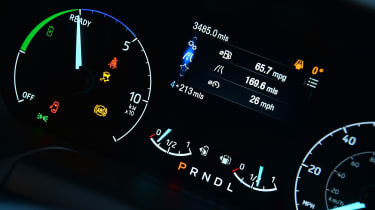Ford Transit Custom PHEV Limited: Living with it
Plug-in hybrid cars and SUVs are everywhere, but how does a petrol-electric drivetrain work in a van? We ran a Ford Transit Custom PHEV to find out
| On fleet since: | December 2020 |
|---|---|
| List price new: | £44,996 |
| Options: | Metallic paint (£780), Enhanced Park Assist (£360), Visibility, Pack – Premium (£660) |
| Mileage to date: | 5,198 |
| Efficiency to date: | 37.3mpg |
| Problems? | None so far |
Report 1: Introducing our Ford Transit Custom PHEV
When we first tested the Ford Tourneo Custom PHEV petrol-electric people carrier, we weren't able to use its plug-in hybrid drivetrain to its full extent, and so recorded some disappointing fuel-economy figures. We therefore resolved to run its light-van counterpart, the Transit Custom PHEV, for a longer period, in order to fully assess its electric-running capability.
Without a home wallbox charger fitted just yet, I was relying on charging from a standard three-pin domestic socket, making sure to plug in every time I parked up to ensure I'd always be leaving the house with a full (or near-full) battery. But despite this dedication, taking delivery of the van just before Christmas 2020 meant running it in very low temperatures – something which affects the range of pretty much any battery-powered vehicle.
Ford claims a maximum of 35 miles can be covered in the Transit Custom PHEV before the range-extender petrol engine has to be called on to top up the battery, but in the depths of winter I was lucky to see 15. That means the three-cylinder engine made its presence felt more than would usually be the case, with a resulting reduction in average fuel economy to 66mpg across January and February, down from the 100+ I'd been seeing before. That's still impressive for a petrol-fuelled van, though; a normal diesel-engined Transit Custom is doing well to return mid-30s miles-per-gallon. Once temperatures headed north in the spring, the electric range increased to 23 miles.
Report 2: Going the distance
My son Rhys has become a big fan of the Transit Custom PHEV's load bay: any time I open it up, he loves nothing more than jumping in the back and putting on a song and dance. The super-bright LED lights in the roof certainly lend it the air of a stage or rehearsal studio, while the large, open and hard-wearing plastic floor lets him jump and slide around without doing any damage.
I've also been putting the load bay to more conventional uses and the combination of this vast space with seating for three up front makes the Transit an enormously versatile vehicle that even serve as a family car of sorts if needed. Our example is the Limited trim level, with Apple CarPlay and a wi-fi hotspot, delivering more than enough connectivity to keep Rhys amused on longer trips.
Warmer weather since our last report has benefited the Ford's electric range, but it's still disappointing to routinely max out at 25, and only once hit 30 miles, when every source of information on the van touts the seemingly unachievable official figure of 35. A bit of extra effort is rewarded, though: you can easily exceed the trip computer's predicted number by driving as smoothly as possible and putting the regenerative braking system into its strongest 'L' mode.
But all the hypermiling tricks in the world won't help you if you've got a properly long-distance jaunt to tackle in the Transit Custom PHEV. This is a vehicle designed primarily for covering multiple short urban trips in a day, so once you get out on the motorway, get up to speed and deplete the battery, fuel economy quickly drops down to the mid-30s you'd expect to see from a regular diesel Transit Custom. And using the engine to charge the battery on the move isn't the solution: that only uses more fuel.
Used for its intended purpose, though, the Transit Custom PHEV does make sense. Charging the 13.6kWh battery on a standard electricity tariff will cost about £1.60 – and even if you only see 20 miles' electric running from that, covering the same distance would cost you about £3 in petrol. So it's not hard to see how the savings could quickly stack up for someone like a courier, plumber or maintenance engineer doing multiple short trips around an urban or suburban area every day.





